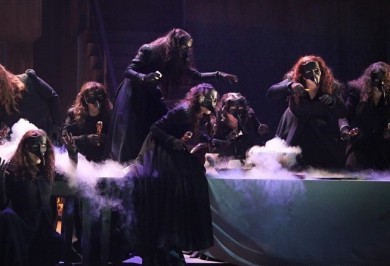Libretto - Francesco Maria Piave,
after the tragedy by William Shakespeare
Original Design - Tanya McCallin
Original Lighting Design - Davy Cunningham
Macbeth – such is the title of Shakespeare’s famous tragedy and one of Verdi’s most popular operas. The titular hero of the opera is a Scots commander in whom the innate human flaw of vanity grows to become an irrepressible mania for power. “O, voluttà del soglio!” (“O, desire for the throne!”) sings his wife, the perfidious Lady Macbeth. The most fundamentally wicked couple in the history of opera, they act in tandem: he commits murder while she incites him to do so. Macbeth is a real “horror opera” with a fascinating mediaeval flavour: here witches cast their spells, there are ghosts, blades are dripping with blood, nobles feast and a sleepwalker roams through the castle. Verdi fully conveyed the seething nature of Shakespeare’s passions in his music. One of the most complex roles not merely in Macbeth but in the entire compendium of world opera is that of Lady Macbeth. Verdi conceived a heroine who was evil and ugly, though on the stage Lady Macbeth is a powerful and passionate woman whom her husband is quite simply incapable of opposing. This opera on a Scottish theme was staged at the Mariinsky Theatre by Scots stage director David McVicar.
Synopsis
Act 1
Scotland in the 11th century. Groups of witches gather in a wood beside a
battlefield. The victorious generals Macbeth and Banquo enter. The witches hail
Macbeth as Thane of Glamis, Thane of Cawdor, and king "hereafter." Banquo is
greeted as the founder of a great line of future kings. The witches vanish, and
messengers from the king appear naming Macbeth Thane of Cawdor.
At their castle, Lady Macbeth reads a letter from her husband telling of the
encounter with the witches. She is determined to propel Macbeth to the throne
(’Vieni! t’affretta!’). It is announced that King Duncan will stay in the castle
that night and when Macbeth enters she urges him to take the opportunity to kill
him. The King and the nobles arrive. Macbeth is emboldened to carry out the
murder (’Mi si affaccia un pugnal?’), but afterwards is filled with horror. Lady
Macbeth, disgusted at his cowardice, completes the crime, incriminating the
sleeping guards by smearing them with Duncan’s blood and planting on them
Macbeth’s dagger. The murder is discovered by Macduff. A chorus calls on God to
avenge the killing (’Schiudi, inferno, . .’).
Act 2
Macbeth is now king, but disturbed by the prophecy that Banquo, not him, will
found a great royal line. To prevent this he tells his wife that he will have
both Banquo and his son murdered as they come to a banquet. Lady Macbeth exults
in the powers of darkness (’La luce langue’). Outside the castle a gang of
murderers lie in wait. Banquo is apprehensive (’Come dal ciel precipita’). He is
caught but enables his son Fleanzio to escape. In a hall in the castle, Macbeth
receives the guests and Lady Macbeth sings a brindisi (’Si colmi il calice’).
The assassination is reported to Macbeth, but when he returns to the table the
ghost of Banco is sitting in his place. Macbeth raves at the ghost and the
horrified guests believe he has gone mad. The banquet ends abruptly with their
hurried, frightened departure.
Act 3
The witches gather around a cauldron in a dark cave. Macbeth enters and they
conjure up three apparitions for him. The first advises him to beware of
Macduff. The second tells him that he cannot be harmed by a man ’born of woman’.
The third that he cannot be conquered till Birnam Wood marches against him.
Macbeth is then shown the ghost of Banquo and his descendants, eight future
Kings of Scotland, verifying the original prophecy. He collapses and regains
consciousness in the castle. Macbeth and his wife resolve to extirpate the
families of Macduff and Banquo (’Ora di morte e di vendetta’).
Act 4
A chorus of Scottish refugees (’Patria oppressa’) stand near the English
border. In the distance lies Birnam Wood. Macduff is determined to avenge the
deaths of his wife and children at the hands of the tyrant (’Ah la paterna
mano’). He is joined by Malcolm, the son of King Duncan, and the English army.
Malcolm orders each soldier to cut a branch from a tree in Birnam Wood and carry
it as they attack Macbeth’s army. They are determined to liberate Scotland from
tyranny (’La patria tradita’).
In Macbeth’s castle a doctor and a servant observe the Queen as she walks in
her sleep, wringing her hands and attempting to clean them of blood (’Una
macchia’). Macbeth has learned that an army is advancing against him but is
reassured by remembering the words of the apparitions. (’Pietа, rispetto amore’)
He receives the news of the Queen’s death with indifference. Rallying his troops
he learns that Birnam Wood has indeed come to his castle. Battle is joined.
Macduff pursues and kills Macbeth, telling him that he was not ’born’ of woman
but ’cut’ from his mother’s womb. The opera ends with a hymn to victory sung by
bards, soldiers, and Scottish women.
Provided by Wikipedia -
Macbeth
(opera)
 Mariinsky Theatre:
Mariinsky Theatre:  Mariinsky-2 (New Theatre):
Mariinsky-2 (New Theatre):  Mariinsky Concert Hall:
Mariinsky Concert Hall: 

